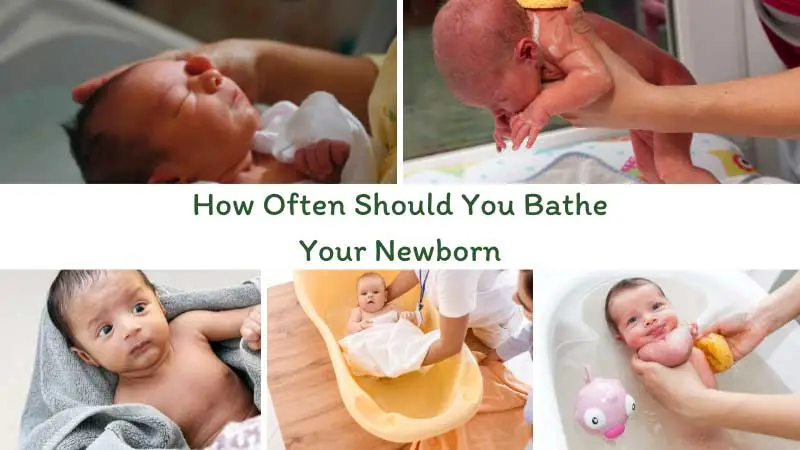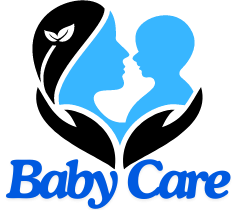As a new parent, you probably have a thousand and one questions about caring for your little bundle of joy. One question often arises How Often Should You Bathe Your Newborn?

Knowing what’s best for your baby can be overwhelming, with many conflicting opinions. That’s why we’re here to help!
It would help if you bathed your newborn 2-3 times weekly during their first month.
In this blog post, we’ll explain everything you need to know about bathing your newborn – from how often to do it to tips for ensuring their safety and comfort during bath time. So let’s dive in!
When To Bathe a Newborn for the First Time?
When it comes to bathing your newborn, there are a few things to keep in mind.
- You don’t want to bathe them too often, which can dry out their skin.
- Secondly, you’ll want to ensure the water isn’t too hot.
- Third, you’ll want to have everything you need reach within so you can focus on keeping your baby safe.
Most experts recommend waiting at least 24 hours after they’re born. This gives their skin time to adjust and heal from the birth process. After that, you can start bathing them every few days or as needed.
If you are concerned about bathing your newborn too soon, consult your doctor or paediatrician. They can provide specific advice on how and when to bathe your baby. Also, according to my experience, I will give you some guidelines discussed below.
How Often Should You Bathe Your Newborn?
If you’re a new parent, you may wonder how often you should bathe your newborn. The answer may surprise you!
It’s not necessary to bathe your newborn every day. Bathing them too often can dry their skin and strip away the natural oils that protect them from infection.
So how often should you bathe your newborn? A good rule of thumb is to bathe them about thrice a week in the first month, then increase the frequency to once a day as they age.
Of course, you’ll also want to give them a quick wipe-down after every diaper change. And if they get dirty or sweaty, feel free to give them an extra bath!
Steps to Take During and After the Bath:
After the umbilical cord stump falls off and the baby’s navel heals, you can start bathing them in a basin or sink. Here are some things to keep in mind:
- Use one hand to support the baby’s head and the other to wash the body.
- Gently cleanse the baby’s face with a wet washcloth. Be careful not to get water in their eyes, nose, or mouth.
- To avoid drying out baby’s skin, don’t use soap every time you bathe them. When you use soap, look for a tear-free formula designed specifically for babies.
- Pat the baby dry with a soft towel instead of rubbing their skin. Then apply lotion while their skin is still damp to help lock in moisture. – Before you dress, baby, make sure the room is warm. Place them on a flat surface, not an elevated area like a bed or changing table.
- Take your time to ensure that all the folds between the baby’s toes, elbows, neck, and other parts of their body are thoroughly cleaned.
- When bath time is over, watch the baby’s temperature closely by feeling their hands and feet. If they seem cold or the room is too chill for your comfort level, bundle them in warm clothes and a blanket.
Once bath time is finished:
- Make sure to keep the baby’s skin dry and clean. Change wet clothing and diapers immediately, and treat the area around their diaper often with an ointment like petroleum jelly or A&D.
- Keep their nails trimmed to avoid scratching themselves — use baby nail clippers, not scissors.
- Moisturize daily to help keep the baby’s skin from getting too dry. Use lotions designed specifically for babies so they won’t get any irritation or allergies.
- Spend plenty of cuddling and playtime after the bath so the baby won’t get too chilly.
- Keep their room ventilated and use a humidifier during cold seasons if necessary.
- Always check the bath water temperature with your wrist or elbow before putting the baby in.
Safety Tips for Bathing Your Newborn:
When you are ready to bathe your newborn for the first time, you should keep a few safety tips in mind.
1. Gather supplies beforehand:
Before any bath, ensure you have all the necessary supplies, such as warm water, a clean towel, and appropriate soap products.
2. Test the water temperature:
It is very important to test the temperature of the water before putting your baby in it. Use your elbow or wrist to check the water is warm but not too hot.
3. Support your baby’s head:
When bathing your baby, support their neck and head in case they become startled or slip. You can use one arm for this purpose and hold them close to yourself for added comfort and security.
4. Be gentle:
It may be tempting, but never dunk your newborn into a bath, as it can be dangerous and uncomfortable for them. Instead, use a cup or scooping motion to fill the tub gently with warm water while cradling their body against yours with one hand.
5. Keep an eye on them:
You must watch your newborn during bath time so that if anything arises, you will be there to take care of it immediately!
6. Dry off your baby:
Once you have finished the bath, promptly wrap them up in a towel and gently pat their skin dry– never rub it. It is essential to ensure they are completely dry before they are put into clothes or their crib, as this can prevent any risks of overheating.
Following these safety tips when bathing your newborn can help make bath time for both of you a safe and enjoyable experience.
Choosing the Right Products for Baby’s Skin:
Bathing your newborn can be a daunting task, but choosing the right products for their delicate skin is important. Here are a few things to keep in mind when selecting bath products for your little one:
- Look for products that are specifically designed for babies. Baby-specific products will be gentler and more effective than those made for adults.
- Avoid products that contain fragrances or other harsh chemicals. These can irritate your baby’s skin and cause problems such as rashes or dryness.
- Choose a mild soap or cleanser that won’t remove the natural oils from your baby’s skin. A gentle, fragrance-free wash is ideal.
- Moisturize your baby’s skin after bathing to help prevent dryness and irritation. A hypoallergenic lotion or cream will do the trick.
- Choose a shampoo that’s designed to be tear-free, so your baby won’t have any stinging in the eyes. You’ll also want something gentle and free from irritants like parabens or sulfates.
I use Some of the Right Products for your Baby’s Skin, which will be very helpful for your baby. CLICK HERE.
Alternatives to Bathing Your Newborn:
There are a few alternatives to bathing your newborn that you can consider.
- One is sponge bathing when you wet a washcloth or sponge and gently clean your baby’s face, neck, and bottom. This can be done instead of a traditional bath every few days. HERE’S HOW TO USE IT.
- Another alternative is top-to-toe wipes, which are pre-moistened wipes that are safe to use on babies skin. These can be used in place of a bath on days when your baby doesn’t need a full bath. HERE’S HOW TO USE IT.
Finally, you can wash your baby’s face, neck, and bottom with a wet washcloth when they don’t need a full bath.
Conclusion:
If your baby is particularly dirty or has a messy diaper, you may need to give them a more frequent bath. Otherwise, every few days should suffice. When bathing your newborn, use gentle, unscented soap and warm water. Avoid hot water, which can be too harsh for your baby’s delicate skin.
I hope you may have heard conflicting advice about how often to bathe your newborn, but the bottom line is that it’s up to you. There is no right or wrong answer; ultimately, you should do what feels best for you and your baby.
If you’re unsure how often to bathe your newborn, talk to your paediatrician or another trusted medical professional. They can offer guidance based on your baby’s individual needs.


8 thoughts on “How Often Should You Bathe Your Newborn? A Guide for New Parents”